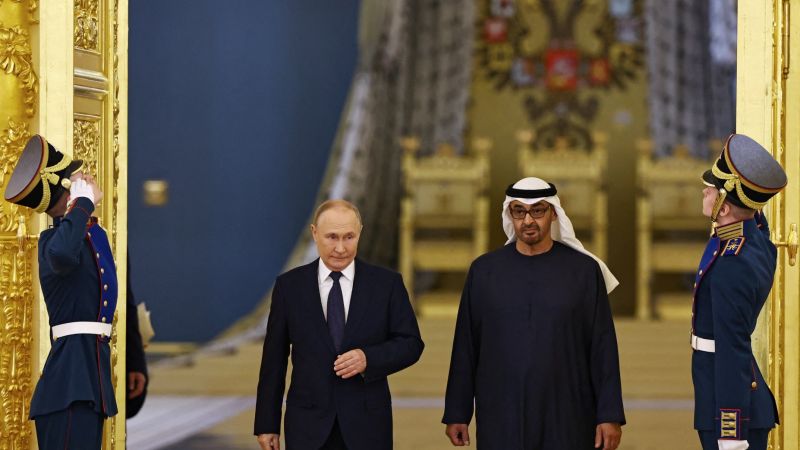UAE President Sheikh Mohamed bin Zayed Al Nahyan arrived in Moscow on Wednesday for high-level diplomatic talks with Russian President Vladimir Putin, marking his third official visit to Russia in as many years.
He was received at the airport by Russian Deputy Prime Minister Denis Manturov, according to the UAE’s official news agency, WAM.
The visit underscores the UAE’s deepening strategic relationship with Russia, with talks expected to focus on expanding cooperation in key sectors such as trade, energy, investment, and regional security. The two leaders are also expected to address pressing international issues, notably the ongoing conflict in Ukraine and wider geopolitical realignments.
This diplomatic engagement comes just days before an anticipated summit between Russian President Putin and former U.S. President Donald Trump, aimed at reviving peace talks related to the Russia-Ukraine war, which began in April 2022. The conflict has resulted in hundreds of thousands of casualties and significant global economic consequences.
Sheikh Mohamed’s last visit to Moscow was on 20 October 2024, shortly after the UAE brokered a significant prisoner exchange between Russia and Ukraine—a move that won Abu Dhabi praise from both sides for its neutral diplomacy. His first official visit to Russia as president took place in October 2022, further cementing his role as a regional mediator and global statesman.
But the timing of this latest visit also places the UAE under increased international scrutiny, particularly over its role in Sudan’s escalating conflict.
Reports emerged this week that the Sudanese army shot down a UAE military transport plane over Darfur, allegedly carrying over 40 Colombian mercenaries intended to support the UAE-backed Rapid Support Forces (RSF). Sudanese military sources claim the aircraft was delivering weapons and foreign fighters to the RSF—an allegation the UAE government has strongly denied.
The fallout has been swift. Colombian President Gustavo Petro confirmed the deaths of Colombian nationals and condemned the practice of mercenary deployment. He vowed to introduce new legislation banning Colombian citizens from engaging in foreign conflicts and directed the country’s ambassador in Egypt to assist in repatriating the bodies of those killed.
The incident adds another layer of complexity to the UAE’s balancing act on the global stage—seeking to deepen ties with major powers like Russia while maintaining a posture of regional influence and neutrality.
As Sheikh Mohamed meets with President Putin in Moscow, analysts suggest the UAE will aim to further position itself as a vital interlocutor in a shifting geopolitical order, navigating between East and West while managing growing pressure over its activities in Africa.
The Kremlin has not released detailed information about the meeting agenda, but both sides have reiterated their commitment to enhancing strategic partnership and cooperation across political, economic, and security domains.
This visit, though diplomatic in nature, unfolds under a backdrop of contested narratives and geopolitical recalibration.

